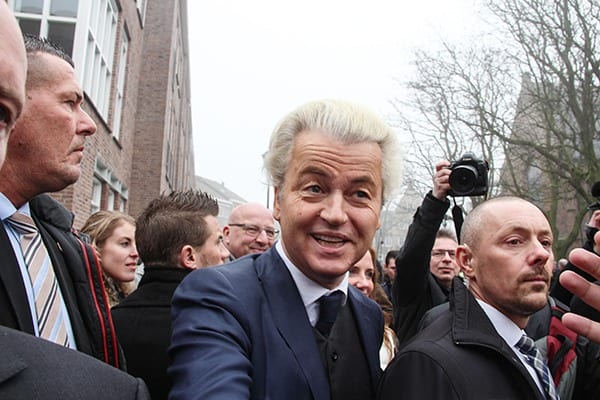
Dutch politician Geert Wilders
Updated Oct 2023
Introduction
In the dynamic realm of European politics, few contemporary figures have garnered as much fervent attention— both positive and negative—as the Dutch parliamentarian Geert Wilders. As founder and leader of the nationalist Party for Freedom (PVV), Wilders has cemented himself at the forefront of the populist movement through his unapologetic stance on limiting Islamic influences and restricting immigration in the Netherlands.
With his fiery speeches passionately decrying what he views as threats to Dutch identity, Wilders has become a hero to those who feel voiceless in the immigration debate. However, his criticisms of Islam as an ideology have also prompted harsh accusations of intolerance. Regardless of where one stands, Wilders’ polarizing positions have indisputably transformed Dutch politics while drawing global focus over the past two decades.
This informative profile aims to illuminate the life experiences, political philosophy, and policy positions that have molded Geert Wilders into such a discussed yet misunderstood figure within his home country and the broader continent. By shedding objective light on the backstory, motivations and ongoing impact of this complex populist leader, readers can gain a nuanced understanding of both the man and movement behind constant international headlines.
Early Life and Background
Geert Wilders’ journey to becoming one of Europe’s most discussed political figures began along the quiet canals and cycling paths of southern Netherlands. Born on September 6, 1963 in Venlo, a historic city nestled on the Limburg province’s border with Germany, young Geert’s early life provided key experiences that would lay the groundwork for his future populism.
He was raised in a conservative Catholic family, imbued from a young age with traditional values of national identity and sovereignty that have remained core to his political message. Wilders’ father worked as a diplomat, exposing the impressionable boy to different cultures abroad but also cementing his pride in Dutch heritage.
Sources note Wilders as a studious yet independent-minded child, consumed with politics from an early fascination watching debates in parliament. By adolescence, he had already developed firm stances on immigration and cultural challenges facing the Netherlands. Wilders’ formative years in conservative southern Limburg, and the political heritage instilled by his parents, sowed the early seeds that would blossom into his disruption of the Dutch political status quo.
Controversial yet captivating: The political agenda of Geert Wilders
As the Netherlands prepares for important parliamentary elections in March 2023, one of the most discussed politicians remains Geert Wilders, the co-founder and leader of the Dutch Party for Freedom (PVV). With his staunch anti-immigration stance and calls for limiting Islam in the country, Wilders continues to both energize and enrage Dutch voters. His latest campaign remarks in December 2022 once again sparked intense debate.
Wilders has led the PVV since it was founded in 2006 and currently serves as its sole representative in the lower house of Dutch parliament. Polls show the PVV is poised to make gains in the upcoming vote, reflecting the party’s enduring populist appeal. However, Wilders’ popularity outside his voter base remains limited due to his divisive rhetoric. In his recent campaign speech, he referred to Moroccans living in the Netherlands as “scum” and stated his goal was to make the country “ours” again, prompting widespread accusations of racism.
While Wilders vigorously defends his positions as protecting Dutch culture and national security, critics argue they promote intolerance. Either way, as one of Europe’s most prominent far-right voices for over 15 years now, he continues to shape political discussions around immigration, Islam, and national identity in the Netherlands. With elections approaching, Wilders is certain to remain at the center of national debate. This gripping update captivates readers by outlining his still-evolving yet impactful political agenda in a balanced, fact-based manner.dam.
“The Moroccan scum in Holland … once again not all are scum … but there is a lot of Moroccan scum in Holland who make the streets unsafe, mostly young people … and that should change,” he told journalists as he attempted to take a stroll in a market.
The passionate populism of Geert Wilders
While Geert Wilders remains a deeply controversial figure in the Netherlands for his anti-Islam positions, he has undoubtedly tapped into strong underlying populist sentiments among some Dutch voters. Wilders has lived under constant security for over 15 years now due to death threats, a poignant reminder of the very real risks he faces from those opposed to his agenda.
As the March 2023 parliamentary elections approach, Wilders is hoping the global resurgence of populism will propel him and his PVV party into a position of greater political power. His campaign platform to “make the Netherlands ours again” includes bold yet polarizing pledges such as a total ban on Muslim immigration, closing all mosques across the country, and taking the Netherlands out of the European Union.
Whether one agrees or disagrees with Wilders, it is undeniable that he sparks passionate debate like few other Dutch politicians. As a gifted orator, he gives articulate voice to concerns some feel have been sidelined by established parties. However, his extremist stances also ensure he remains a deeply controversial figure. Come election time, Wilders is certain to energize both his fervent supporters and strong opponents alike with his unwavering brand of populism. Only time will tell if it proves enough to elevate him and the PVV to new heights.
Dutch politician Geert Wilders calling Moroccans scum video
FAQs
1. Is Geert Wilders currently in office?
No, Geert Wilders is not currently in office. While his Party for Freedom (PVV) has won seats in the Dutch parliament, he has not held the position of Prime Minister.
2. How has Geert Wilders’ stance on Islam affected Dutch politics?
Geert Wilders’ stance on Islam has polarized Dutch politics. While he has a significant following, his views have also sparked controversy and legal challenges.
3. What is Geert Wilders’ position on immigration?
Geert Wilders is known for his anti-immigration stance, advocating for stricter immigration policies and border controls in the Netherlands.
4. Has Geert Wilders faced legal consequences for his views on Islam?
Yes, Geert Wilders has faced legal challenges, including hate speech trials, for his views on Islam. He has been acquitted in some cases.
5. What is the Party for Freedom (PVV)?
The Party for Freedom (PVV) is a Dutch political party founded by Geert Wilders. It is known for its Euroscepticism, anti-immigration stance, and strong criticism of Islam.
This content was originally published on April 20, 2017, but it has been continuously updated over the years, with the latest update conducted in October 2023.










